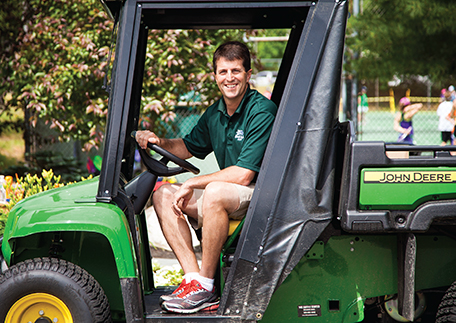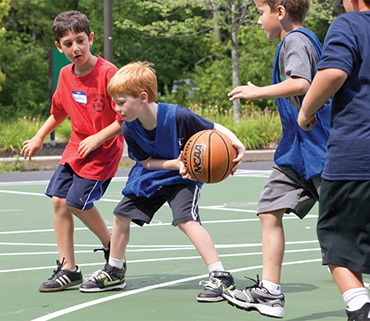
Photo: Pat Piasecki
Jim Castrataro ’93 in the Gator
Jim Castrataro ’93 was always a camp kid. Growing up, he and his three older sisters went to Nabby Day Camp (now Camp Nabby) in Mohegan Lake, N.Y. His father, otherwise a teacher, worked summers at the camp as an administrator. “My dad had a big station wagon, and we’d pick up six or eight kids. Everybody in the back of the car. No seatbelts. We drove everybody to Nabby Day Camp,” says Castrataro. Kids could play on trampolines, take archery and swimming lessons, hone soccer skills. “I loved it,” he says.
Around the fifth grade, Castrataro switched to lacrosse camp, held at West Point and run by its head lacrosse coach. “I loved being able to play a sport all day long,” says Castrataro, “and I loved sleeping in the dorm, eating in the big dining hall, being on a college campus, seeing the plebes march at 5 in the morning. Everything about it was just great.”
So perhaps kismet brought Castrataro back to Babson to work with the summer camps. Initially, Castrataro’s main job—or, more appropriately, jobs—was coaching. In 1998, he was head coach of the Babson ski team and assistant coach of lacrosse. To make ends meet, he also took the job of administrative assistant for summer programs, soon taking on the role of coordinator. As the years went by, Castrataro’s responsibilities grew. He became head coach of the ski and lacrosse teams and assistant director of summer programs. “That was a bit much,” he says.

Photo: Paige Brown
This summer kids can choose from 11 sports camps, all of them run by Babson coaches.
Eventually, he let the coaching jobs go and became director of summer programs. The job entails much more than running the Babson camps. Castrataro manages external summer programs as well. So when the New England Cheerleaders Association wants to host its camp at Babson, they contact Castrataro. So does the National Youth Leadership Forum for its summertime conferences. To make sure “nobody bumps into each other,” Castrataro coordinates with other Babson-run summer programs as well.
But his favorite part of the job is working with the Babson camps. The frenetic pace suits him. To start, each year he has to figure out which camps to offer. Trial and error helps. “If there is a sport out there, we’ve probably tried it,” he says. Flag football did well for several years, and then it died out. Softball never took off, despite three summers of trying. This year, volleyball is a new offering.
Of the 11 sports camps to choose from, ice hockey currently is the most popular (it sold out in February). Soccer is popular with kids, too, says Castrataro, but it’s also extremely competitive. “There are a lot of summer soccer programs. In this area, there are probably six private soccer groups,” he says. “These programs are year-round, and we’ve got to pull those kids for just a week. It’s really tough.”
To staff the camps, Castrataro hires about 150 to 160 employees. (“Some of them are hired for just a week. They all have to go through our entire human resources process.”) He keeps track of applications, forms, and payments. (“A big change for us—we are completely online now.”) He meets with the Board of Health. (“All of our campers have to have updated records of immunization. All our staff have to have updated records of immunization. That needs to be reviewed by the Board of Health each week. And we have a weekly site inspection. I’ve worked with Lenny, Wellesley’s director of the Board of Health, for 10 years.”) He manages all the schedules, including lunch breaks for 2,000 kids during the July peak season. (“It’s very strictly timed. They get 35 minutes.”) If the weather turns bad, he’s figuring out what to do with all those kids. (“Lightning storms don’t bother me so much, because they’re usually pretty quick. We can see them coming, and we can get everybody to a safe spot. We use the same weather service as the Boston Red Sox. A much more challenging day is a complete washout.”)
Some days, Castrataro misses being the coordinator, riding in the four-wheel-drive Gator all day, checking on campers, and lending a hand when needed. “As coordinator, you come in and drive around campus to make sure a construction crew didn’t show up unexpectedly and is blocking the road that you’re about to have 500 cars come in on,” he says. “Then you go to, let’s say, our drop-off spot for lacrosse, and you direct traffic. Then you get oranges for snacks in your Gator. So you meet with Sodexo, and they forgot to cut the oranges that day, so you’re cutting oranges to help them get ready. Then you’ve got to deliver them all to the kids, so you get to see all the kids and say hi. Sometimes you have snacks, sometimes you pick up a tennis racket and play tennis for a couple of minutes. Then you go to lunch and make sure they’re not throwing food. You have the radio, and the coach says I need more T-shirts, I need water bottles. You’ve got to get popsicles, because we do snacks at the end of the day. You’re running all day. You’re outside all day. I loved it. I loved it.”
As fun loving and gregarious as he is, Castrataro takes his responsibilities as director seriously. Making sure the campers are safe and, if an incident happens, cared for immediately are his top priorities. “The thing that keeps me up at night are the accidents and the things I can’t see,” he says. “That’s the real side of this job.” Over the years, he has had to deal with some emergencies, but nothing he couldn’t handle—so far. “We’ve been fortunate,” he says.
His own two children already are camp kids, says Castrataro, although they don’t come to the Babson camps. Castrataro lives too far away and works too many hours to enroll them here, so they attend a day camp closer to home. “My 8-year-old daughter goes all summer. She can be a girly-girl, but her favorite is this thing called frog-bogging, and they literally go to a giant mud hole and look for frogs. There are pictures of her holding these huge frogs. It’s awesome,” he says. “She loves it. She’s a camp kid. She’s just like her dad. She can’t get there quick enough.”—Donna Coco
